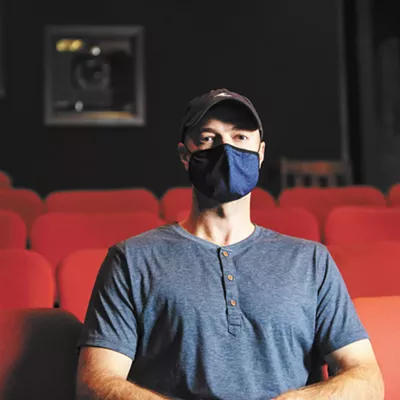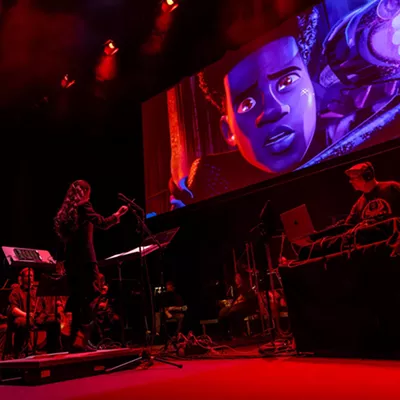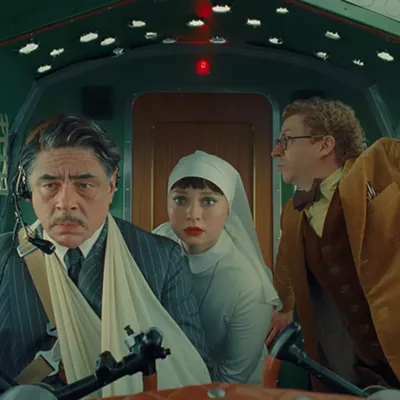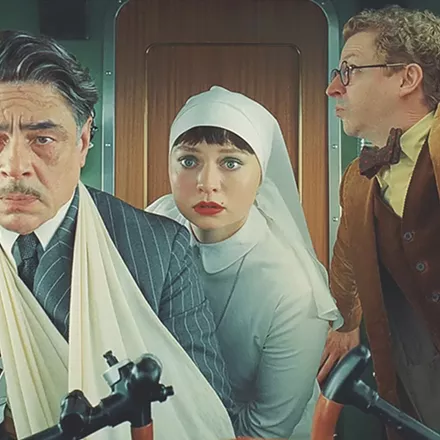Any cohesive film has a certain rhythm to it, and in the particular case of I Am Not a Witch, the rhythm is weighty, tangible and multisensory.
This internationally produced drama, the feature debut of writer-director Rungano Nyoni, opens with a lengthy shot onboard an African tour bus set to Vivaldi's "Winter," and only gets more stylistically striking and structurally unconventional from there. Soon, frames are freezing without warning, and crowds are exploding into cheers before being suddenly silenced. Such startling moments are punctuated by scenes wherein the camera seems to be actively trying to hide its own existence, sometimes lingering on one subject for an uncomfortably long time.
For these reasons and more, I Am Not a Witch is a tough film to pin down. It tells a story about social oppression and the illusion of freedom, laying out a thinly veiled, deeply biting commentary on a set of issues that are relevant all around the world. But the story is told through a very specific lens: that of Shula, a quiet young Zambian girl unfairly accused of witchcraft. Nyoni apparently drew inspiration for the film from real-life accusations of witchcraft in Zambia, but most of the details seem drawn in for thematic and stylistic effect. For example, the witches are leashed by billowy pink ribbons attached to great spools, contrasting in stunning fashion with Zambia's dry, desert-y expanse.
After the accusations are leveled against Shula, she is sent by the selfish municipal leader Mr. Banda to live with a local band of witches, who are forced into a leashed, slave-like existence for fear that they would take flight and wreak havoc if allowed to roam free. Banda quickly takes to exploiting Shula's apparent mystical gifts for his own political and financial gain. At night, she is cast back to live with her own kind, and her companions don't treat her much better. They spend their free evenings either raucously consuming the gin she brings back as rewards for her miraculous deeds, or trading bottles of it for flashy wigs.
Yes, Shula seems used by just about everyone who comes across her. Young actress Maggie Mulubwa gives a performance that is largely nonverbal, but she is nonetheless a revelation. Shula is helplessly passive, jerked this way and that by the adult forces that determine her fate. When prompted, she usually foregoes the chance to speak out, but her quietness is not aggravating. Rather, Shula seems to understand a grave truth — that her interjections could not possibly redirect the course of her unfortunate existence. And so, she mostly watches, her piercing gaze conveying a hefty emotional range. In many ways, this is a story told entirely through the reflections in this young girl's eyes.
Though Shula's life is a mostly tragic affair, I Am Not a Witch is not a wholly morose viewing experience. The film tends to find humor in the small things: in the ridiculousness of the accusation that Shula has poisoned a town's water source, the bumbling inability of Mr. Banda to bathe himself, and even the darkly amusing necessity that the witches carry their unwieldy spools with them wherever they go, lest their ties be broken, turning them into goats.
These scattered instances of comedy are not enough to make I Am Not a Witch a fun watch. The film's offbeat sensibilities are bound to turn off some viewers, but it was quite obviously never meant for mainstream audiences. It's unusual for a multitude of reasons, bound for the fringes of filmic appreciation just as the witches of its plot are forced onto the fringes of their society — a fittingly unusual film about unusual people. Those open to an experience that can be jarring and blunt will find in this film an organic, unignorable beauty. ♦






















